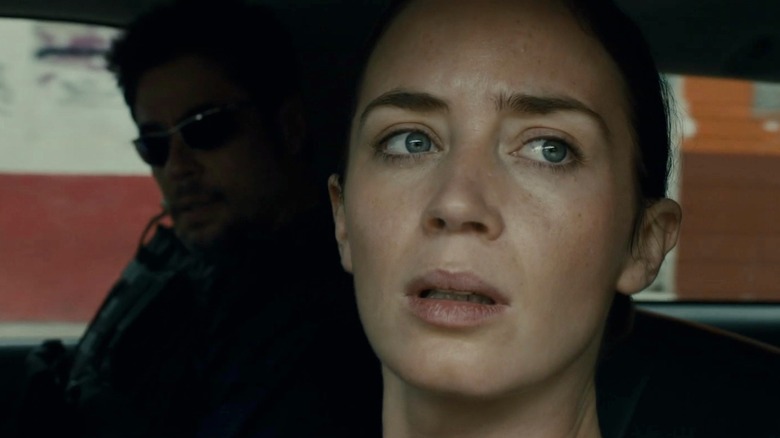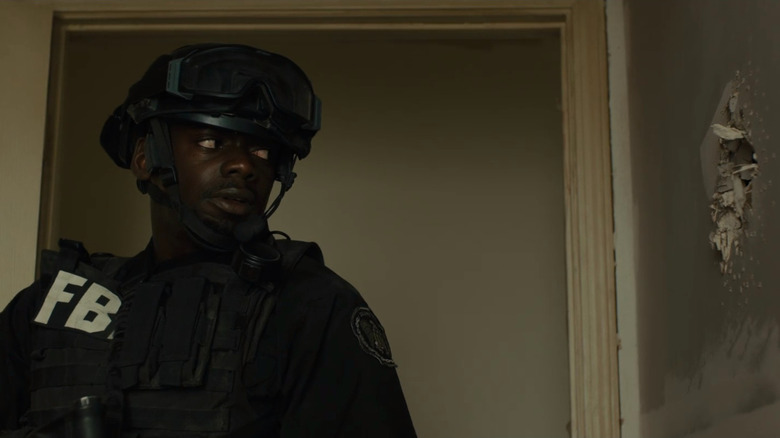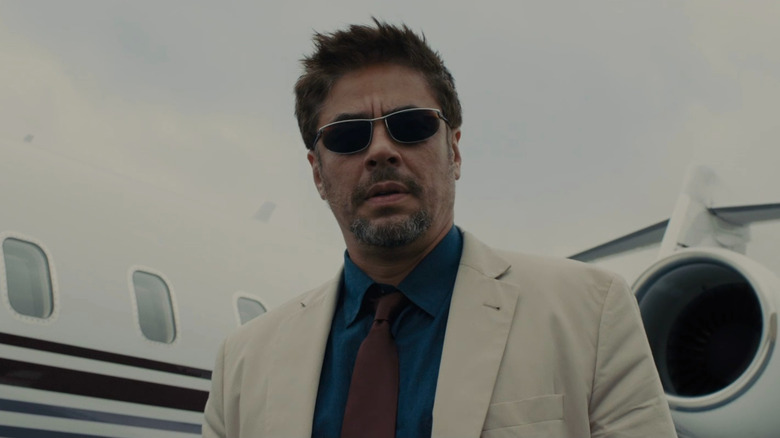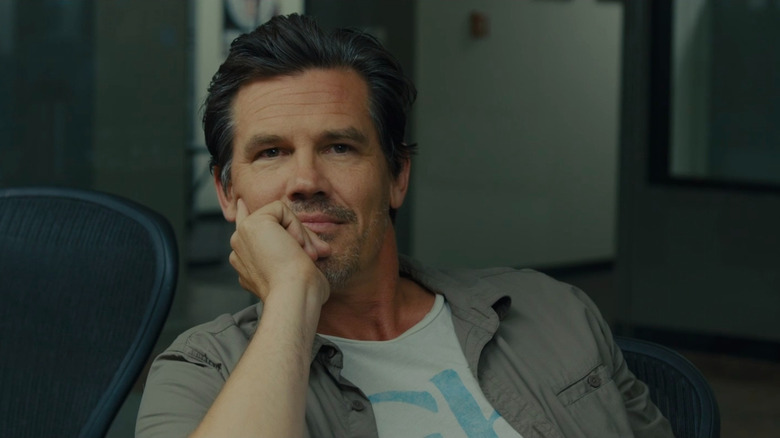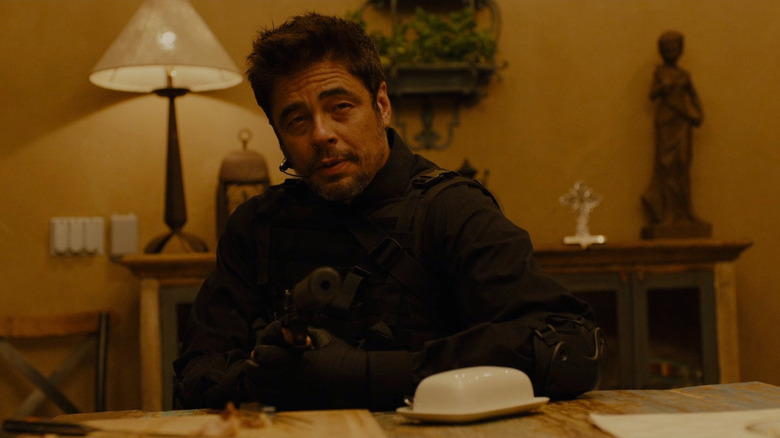The Daily Stream: Sicario Rips From The Headlines, Into The Gut
(Welcome to The Daily Stream, an ongoing series in which the /Film team shares what they've been watching, why it's worth checking out, and where you can stream it.)
The Movie: "Sicario"
Where You Can Stream It: Prime Video
The Pitch: Emily Blunt's FBI everywoman gets in over her head as she's drawn into a web of subterfuge amid a black op with no clear objective.
Earlier this month, just before the President visited Mexico, there was news that the U.S. extradition of El Chapo's son had been halted after an arrest operation there left 29 people dead. El Chapo himself is the former drug cartel leader, now imprisoned stateside, who was both a character in "Narcos: Mexico" and the subject of his own eponymous Netflix series. In 2015, the year "Sicario" thundered into theaters, he escaped prison through an underground tunnel before he was later recaptured.
If any of this sounds familiar, it may be because it bears some passing similarities to the plot of "Sicario," which was written and produced before these particular real-world events took place. "Sons of Anarchy" actor (and Texan) Taylor Sheridan made the transition to screenwriting with this film, basing its violence on true-life border stories of "bodies on bridges and bodies in walls" in a drug war gone wrong.
More than once, Sheridan has referred to "Sicario" as the first part of a thematic trilogy exploring the "modern American frontier" (with the neo-Westerns "Hell or High Water" and "Wind River" forming the second and third chapters). For his part, director Denis Villeneuve once called "Sicario" a "hybrid of arthouse film and action movie." It's also a white-knuckle thriller, but that's not the point.
Why it's essential viewing
"Sicario" shows where the bodies are buried, and it's so close to home as to be in the very walls of the American "house of horrors," as a news broadcast calls the Arizona tract house at the beginning of the movie. Blunt's relatable screen presence as protagonist Kate Macer is a fundamental part of what makes this film work better than its testosterone-driven sequel, "Day of the Soldado." On the broadest level, Kate's story is that of a person outmatched by a hostile world, where life becomes a relentless onslaught of punishing things that beats you down, strangles you, and holds a gun to your head until you have no choice but to go along with it.
Yet this is not entirely Kate's story. While many films might pay lip service to the idea of a strong female character, Kate is as vulnerable as her FBI forebear Clarice Starling. She's also American, and by the end of the movie, we've shifted perspectives from her to Benicio del Toro's Mexican hitman, the titular Sicario, Alejandro Gillick.
After some onscreen text explaining how "the word Sicario comes from the zealots of Jerusalem, killers who hunted the Romans who invaded their homeland," the movie opens with a sunny shot of a housing development in the suburbs of Phoenix. Almost immediately, any sense of domestic normalcy is shattered by the arrival of a SWAT team, clad in black bulletproof gear. For their targets, including an ill-prepared TV watcher inside the house, trouble arrives not on their doorstep, but in the form of a van crashing right through the wall. It's not long before "Sicario" peels open the remaining walls to show the evil nesting right within our own heartland.
The land of wolves
Throughout "Sicario," the late Jóhann Jóhannsson's score swells, thumps, pounds, and gallops like an irregular heartbeat. At times, the music drops out altogether, leaving the movie wrapped in an unnerving stillness as the viewer is left to observe with the feeling that something bad is about to happen. Parts of the score are almost reminiscent of James Horner's "Aliens" soundtrack (or maybe it's just that we're watching another paramilitary unit where one of the guys says, "Stay frosty.")
The film's dialogue is minimalist, too, eschewing exposition in favor of hints and asides. It thrusts Kate (and, to a lesser extent, her partner, Reggie, played by Daniel Kaluuya), into a powder-keg situation with very little explanation, leaving her and the audience to figure things out together like it's their first day on the job somewhere and they've received insufficient training.
Kate's CIA handler, Matt Graves (Josh Brolin), strides around in flip-flops as if to literalize the character traits of "Yankee" stridency and flippancy (not to mention the digging of foreign graves). He says she's there to learn and wants her to sponge up everything she sees, but the only stated objective of their Joint Task Force mission is to "dramatically overreact." And when he tells her she's boarding a private plane to El Paso, it lands across the border in Juarez.
Even when Kate asks questions, she can't get a straight answer. "You're asking me how a watch works," Alejandro tells her. "For now, just keep an eye on the time." The movie is all about awakening her to the wolves in her midst, who won't hesitate to manipulate or manhandle her toward their own ends. "You need somebody watching your six," Reggie says, "'cause I promise you, they aren't."
Monsters beget monsters
As "Sicario" goes from a tense traffic jam to a night-vision tunnel raid, plot twists reconfigure our understanding of what's going on, tilting the ground under our feet toward Alejandro, the dark soul of personal revenge amid a foreign conflict. His character takes over the movie and shows how a government's byzantine power plays can sow controlled chaos, creating monsters to fight monsters. It's only right that the third act should belong to him. At the same time, the subplot involving a corrupt cop named Silvio (Maximiliano Hernández) and his family shows the human face of the collateral damage men like Graves and Alejandro cause.
The one-two punch of "Prisoners" and "Enemy" with Jake Gyllenhaal made cinephiles sit up and take notice of Villeneuve; "Sicario" is what riveted them to their seats, where they would be joined in due time by an even bigger blockbuster audience. With his "arthouse" action movie, Villeneuve evinced a burgeoning mainstream auteurist sensibility similar to that of Christopher Nolan in "Batman Begins." After "Sicario," Villeneuve was off to the races, with the more epic "Arrival" and the quietly subversive "Blade Runner 2049" establishing him as a worthy sci-fi successor to Ridley Scott and perhaps the most consistent high-level operator to emerge from the directing pool in the 2010s.
With "Sicario," everything came together at just the right time: Sheridan's script, Villeneuve's direction, Jóhannsson's music, a stellar cast, and the Oscar-nominated cinematography of Roger Deakins. It's an expertly crafted film that continues to hold rewatch value even as headlines continue to mirror its vision of a world coming apart at the seams.
A shaky system
There's been talk of a third possible "Sicario" movie, which Brolin says has already been written and rewritten, though it hasn't gone beyond the scripting stage, as far as we know. Sheridan has since directed his own films, "Wind River" and "Those Who Wish Me Dead," and he's overseeing a whole TV empire now with "Yellowstone," its streaming spin-offs, and too many other Paramount+ shows to enumerate. It feels like he's spread a bit thin, while Villeneuve has moved on to science fiction and is also busy making what could end up being a different sort of trilogy with "Dune: Part 2" and the potential threequel, "Dune: Messiah."
It would take something special to recapture the creative alchemy that made the first "Sicario" work so well. Nothing egregiously bad sticks out in memory about the sequel, "Sicario: Day of the Soldado," but that's just it. "Day of the Soldado" was a more forgettable follow-up that was missing some of the key creative people behind "Sicario," including Villeneuve, Blunt, Deakins, and Jóhannsson.
Brolin himself acknowledged the first movie's lightning-in-a-bottle nature on the Team Deakins podcast (via MovieWeb), saying, "There's something really special about 'Sicario,' there's something quieter and there's something a little more intelligent in how it unravels."
In the end, "Sicario" transcends the precarious U.S. drug war to encompass the whole of human government and geopolitics. It shows how the necessary apparatus of civilization can hide terrible truths—enough to shake your faith and make you think the entire system is built on a foundation of lies. Kate is the individual up against that system, and as she looks around and sees men spraying bullets in civilian areas, I think she speaks for all of us when she says, "What the f*** are we doing?"
